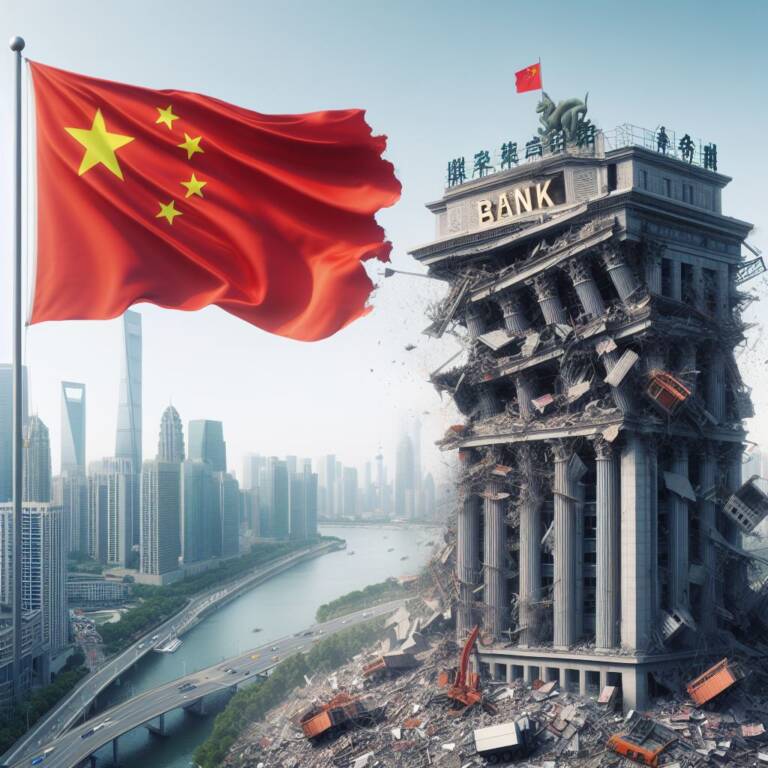Chinese informal bank Zhongzhi files for bankruptcy. The government is looking for a quick solution. Lehman moment?

China's erratic but huge Zhongzhi Bank has filed for bankruptcy, Beijing's First Intermediate People's Court said Friday, which accepted the liquidation request.
Zhongzhi said he was “obviously” unable to repay his debts, according to the statement, seen by Bloomberg.
In November, Zhongzhi declared a shortfall of as much as $36.4 billion and told investors, in an open letter, that it was "severely insolvent", adding that management had "gone wild" after the death in 2021 of the company's founder. company, Xie Zhikun.
An audit calculated Zhongzhi's debts as of November at between 420 and 460 billion yuan ($64.4 billion), compared with assets of 200 billion yuan ($28 billion). At its peak, the firm had more than $140 billion under management, Bloomberg reports.
Zhongrong International Trust, a subsidiary of Zhongzhi, had about $108 billion in assets under management at the end of 2022, according to the Wall Street Journal. However, several Chinese companies said in documents that they had not received expected interest or principal payments for products operated by Zhongrong.
Days after Zhongzhi's open letter, the lender's wealth management arm was the subject of a police investigation for unidentified crimes, the Financial Times reports.
Zhongzhi's failure highlights potential flaws in China's $2.9 trillion trust sector, a loosely regulated gray area of the financial system that offers investment products to wealthy individuals and companies. The sector is a crucial source of alternatives for its borrowers, which include real estate developers and local governments.
In recent years, the Chinese government has stepped up pressure to reduce trust funds' exposure to the real estate sector. The exposure of Chinese trust companies to the real estate sector in the second quarter of 2023 fell to 6.7%, from 15% in 2019, as reported by the Financial Times, citing research by Natixis.
Zhongrong's trust funds held 11% of their assets in real estate in 2022, according to the company's annual report, seen by The Wall Street Journal.
“The persistent decline of the real estate market, coupled with stringent policies and increased financial anti-corruption measures, has hampered the timely collection of assets,” Zhao Jian, head of the Atlantis Financial Research Institute in Beijing, told Bloomberg. “Redeeming these assets has become extremely difficult.”
A Hong Kong-based fund manager from a Chinese financial group told the Financial Times that it was "quite surprising" that Zhongzhi went "straight into liquidation" because other Chinese companies with missed payments often chose to delay the start of the renovation.
Zhaopeng
But Xiaoxi Zhang, an analyst at Gavekal Dragonomics, said the ripple impact is still possible.
“Domestic investor sentiment could worsen, especially for wealthy investors,” he told the Wall Street Journal. “And, of course, other shadow banking institutions are likely to follow suit.”
Until now, the Chinese authorities had not allowed the failure of large banking/credit companies or those linked to the real estate sector. To give an example, evergrrande is still a company undergoing restructuring and, despite the enormous debt, it has not yet gone bankrupt. The fact that Zhongzhi, whose problems have been known since October-November, is instead being driven into bankruptcy indicates a change in the policy of the Beijing authorities.
It appears that the government is now looking for a quick solution to the problem of bad loans, rather than launching long and seemingly interminable restructurings. Perhaps behind this decision there is the awareness that the liquidation of the devalued properties cannot take place without realizing enormous losses, such as to justify the actual bankruptcy of these institutions.
These calculations, however, can lead to a "Lehman Moment": as happened in October 2008, the failure of a bank, or an unregulated quasi-bank, can trigger panic on the market and lead to the failure of a 2.9 trillion dollar sector, with devastating repercussions. If Zhongzhi brings other shadow banks with him, the impact on the wealth of Chinese families will be such as to lead to significant impoverishment and therefore a decline in Chinese domestic consumption, triggering an economic crisis with results that are difficult to predict.

Thanks to our Telegram channel you can stay updated on the publication of new Economic Scenarios articles.
The article Chinese informal Zhongzhi Bank files for bankruptcy. The government is looking for a quick solution. Lehman moment? comes from Economic Scenarios .
This is a machine translation of a post published on Scenari Economici at the URL https://scenarieconomici.it/la-banca-informale-cinese-zhongzhi-dichiara-bancarotta-il-governo-cerca-una-rapida-soluzione-momento-lehman/ on Mon, 08 Jan 2024 07:30:04 +0000.
